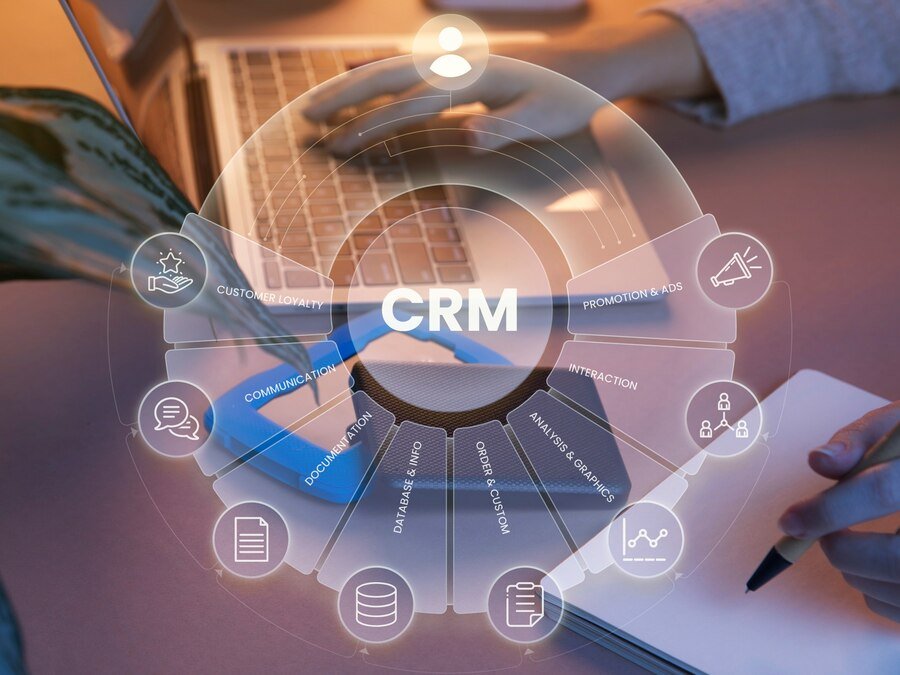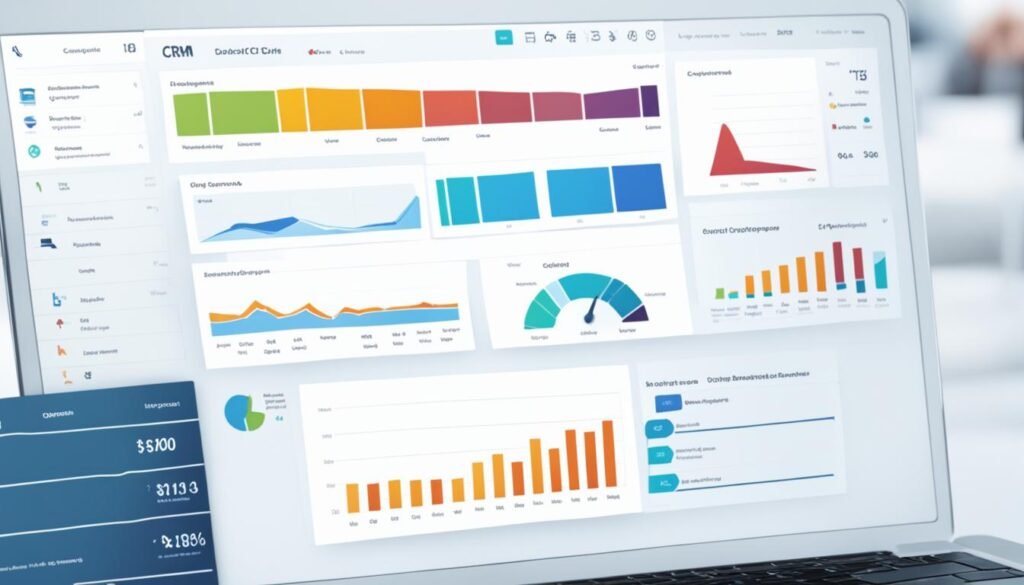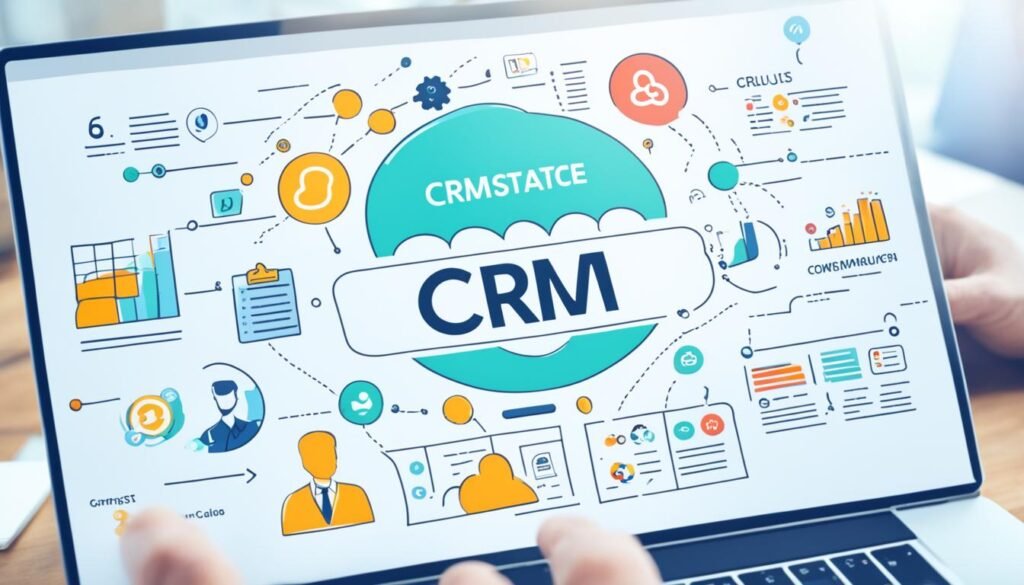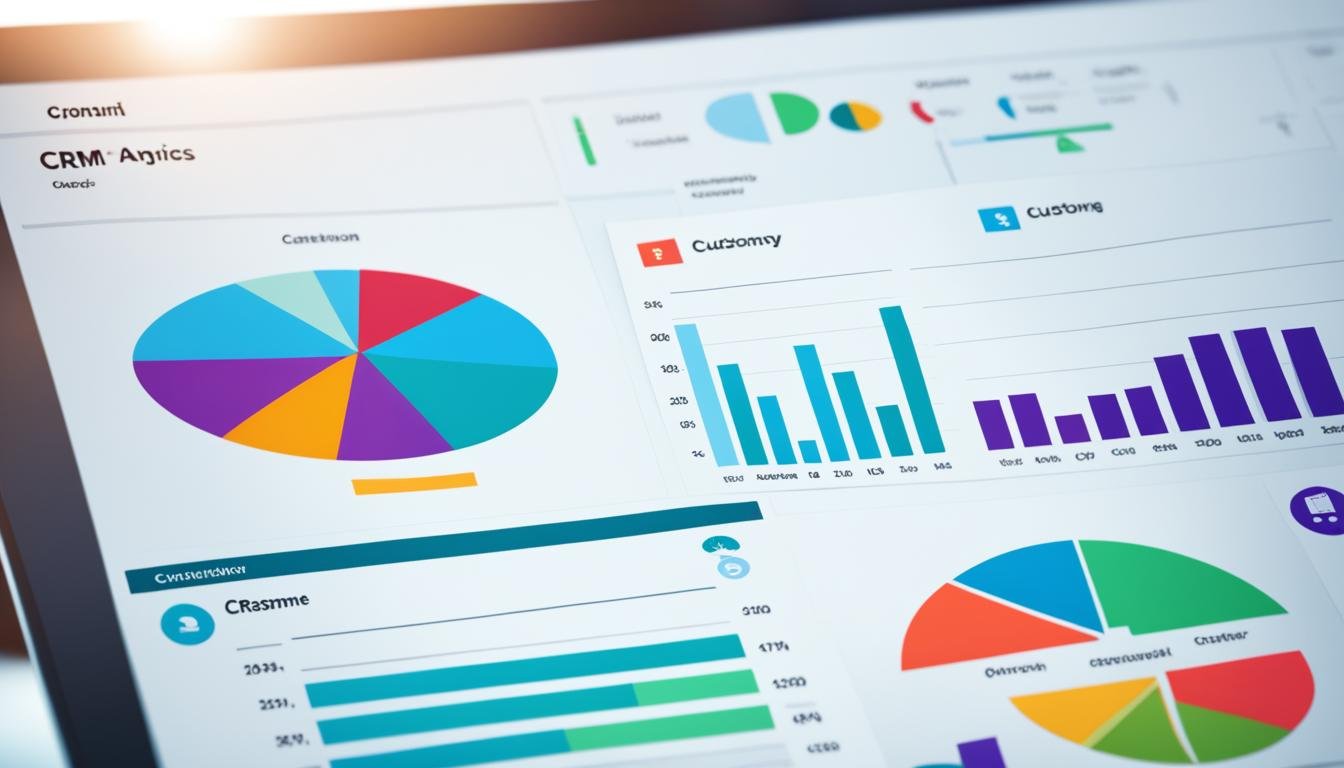If you’re a small business owner, finding the right customer relationship management (CRM) software is key. This guide compares top CRM Features Comparison solutions to help you choose wisely. CRM software is vital for small businesses. It helps manage customer data and sales processes in one place.
It offers tools for contact management, tracking sales pipelines, and gaining insights from data.
We’ll look at HubSpot, EngageBay, and Salesforce Starter. We’ll see how they perform in managing contacts, tracking sales, and providing reports and analytics. Our aim is to help you find a CRM that fits your business needs and budget.
For startups or established small businesses, the right CRM Features Comparison is crucial. It helps in building customer relationships, boosting sales, and making informed decisions. Knowing what top CRM Features Comparison solutions offer helps you pick one that empowers your team and meets your goals.
Table of Contents
Introduction to CRM Features Comparison for Small Businesses
CRM, or customer relationship management software, is a key tool for businesses of all sizes. It helps manage customer interactions and relationships. For small businesses, CRM Features Comparison systems are very useful. They provide a single platform to handle customer data, sales, and marketing.
What is CRM Features Comparison Software?
CRM Features Comparison is used by companies to manage their customer relationships well. It lets businesses keep and access customer info, track sales, and send targeted marketing. All these happen from one platform. CRM solutions help small businesses work better and give customers a great experience.
Benefits of CRM Software for Small Businesses
- Improved customer data management: CRM systems put all customer records in one place, making it easy to get and update info.
- Enhanced sales productivity: CRM tools make sales tasks automatic, leading to better lead management and tracking the sales pipeline.
- Better marketing and customer engagement: CRM platforms let small businesses sort customers, send personalized messages, and run focused campaigns.
- Increased customer retention: CRM software gives a full view of the customer. This helps small businesses offer better service and build stronger relationships.
CRM software is a big help for small businesses. It lets them manage customer interactions better and grow their business. By making customer data, sales, and marketing more efficient, these solutions help small companies use their resources well and improve the customer experience.

This image from freepik
CRM Features Comparison
CRM software is key for managing customer data. It helps small businesses keep track of customer data in CRM. You can store names, emails, and more in one place. This makes it easy for everyone to see the latest customer info.
Contact Management
Some CRM tools also have cool features. You can automatically capture data, find duplicates, and customize profiles. This makes managing contacts better.
Sales Pipeline Management
CRM software is great for tracking sales too. It lets small businesses see where leads are in the process. You can track deals, predict sales, and use visual pipelines.
It also has tools like automated scoring and tracking. These help sales teams focus and close more deals. Plus, it automates tasks and sends reminders to make sales smoother.
Reporting and Analytics
CRM software gives you deep insights into your sales and customers. It has reporting tools and dashboards for tracking important stuff. You can see things like how well leads convert and how fast deals move through the pipeline.
This helps businesses make smart choices. Some CRMs even use AI for deeper insights. This makes it easier to spot trends and improve sales and marketing.

“The CRM contact management capabilities of CRM software are a core benefit, allowing small businesses to organize customer information and ensure all team members have access to up-to-date customer data.”
Top CRM Software for Small Businesses
Small businesses have many CRM (Customer Relationship Management) software options. Let’s look at three top CRM solutions for small businesses: HubSpot CRM, EngageBay, and Salesforce Starter.
HubSpot CRM
HubSpot CRM is great for small businesses. It has lots of features at a good price. The free plan lets you manage contacts, send emails, and view basic reports without limits.
This makes HubSpot CRM perfect for new CRM users. There are paid plans too, with more features like sales automation and advanced analytics. HubSpot’s easy-to-use interface and help resources are great for small businesses.
EngageBay
EngageBay is ideal for small businesses. It offers sales, marketing, and customer service tools at a low cost. You can start with the basic plan and upgrade as needed.
EngageBay has a simple interface and customizable dashboards. It also works well with other business tools. Plus, the support team is known for being helpful to small businesses.
Salesforce Starter
Salesforce, a top CRM software company, has a special plan for small businesses called Salesforce Starter. This plan gives small businesses access to Salesforce’s powerful CRM tools at a lower cost.
Salesforce Starter includes contact management, sales tracking, basic reports, and email integration. It’s a good choice for small businesses wanting Salesforce features without the high cost.

Choosing the Right CRM for Your Small Business
When picking the right CRM software for your small business, think about a few key things. The CRM should be easy for your team to use and adjust to your business needs. It should also work well with other tools like email and accounting software.
Factors to Consider
- Ease of use: The CRM should have a intuitive interface that your team can easily learn and use.
- Customization options: Look for a CRM that allows you to tailor the platform to your business needs.
- Integrations: Ensure the CRM can integrate with your existing business tools and software.
- Reporting and analytics: Robust reporting and data analysis capabilities are essential for informed decision-making.
- Scalability: Choose a CRM that can grow with your business and accommodate future needs.
- Customer support: Reliable and responsive customer support is crucial, especially for small businesses with limited IT resources.
Pricing Models
When choosing a CRM for your small business, consider the pricing. Costs can vary a lot, from free to very expensive. Look for CRMs with affordable plans and flexible pricing. Also, check for free trials or freemium versions to test before paying.
Transparent pricing with no hidden fees is key. This way, you won’t be surprised by extra costs.

By thinking about these factors and pricing, small businesses can find a CRM that fits their budget and helps them grow. The right CRM can bring big benefits, like better customer retention and more efficient sales. It can also improve your business overall.
User-Friendliness and Customization
When looking for the best CRM software for your small business, focus on user experience and customization. The CRM should have an easy-to-use interface. This way, your team can use it without needing a lot of training.
Top CRM solutions like HubSpot and EngageBay are great for small businesses. They have clean dashboards and simple workflows. This makes using the CRM easy and helps your team use it more.
It’s also key to find a CRM that you can customize for your business. Look for platforms that let you change the interface, automate tasks, and create custom views and reports. This customization makes sure the CRM fits your business and helps your team work better.
When picking a CRM, focus on how easy it is to use and how you can change it for your business. This way, you get the most out of your CRM investment. The right CRM will help your team manage customer relationships better and grow your business.
“Fifty-two percent of multiproduct users say Salesforce has exceeded ROI expectations.”
Being able to customize the CRM is very important. It makes sure the CRM fits your business and helps your team work well.
Ease of Use and Workflow Automation
- Intuitive, clutter-free interface for easy navigation
- Streamlined workflows to boost team productivity
- Automated tasks and reminders to enhance efficiency
Personalization and Customization
- Tailored user interface to match your business needs
- Custom views, reports, and dashboards for data-driven insights
- Flexible configuration to align the CRM with your operations
Choosing a CRM that is easy to use and can be customized is key for small businesses. This approach helps you get the most from your CRM, improves customer relationships, and grows your business.
Integration with Other Tools
Linking your CRM with email marketing tools helps you communicate better with customers. Many CRMs, like HubSpot CRM and Salesforce Starter, have built-in email marketing or work well with popular email services. This lets small businesses handle customer data, email campaigns, and interactions in one place. Being able to sync emails, track engagement, and automate workflows makes your CRM and email marketing work better together.
Productivity Tools
Connecting your CRM with other business tools also boosts your small business’s efficiency. Look for CRMs that work with apps like project management software, accounting systems, and collaborative platforms. This streamlines data and automates tasks, cutting down on manual work and improving team collaboration. With your CRM and other business apps working together smoothly, your small team can focus on what matters most.




One Comment on “Comparing Key Features of Leading CRM Features Comparison for Small Businesses 2024”